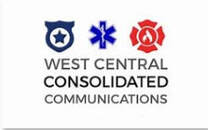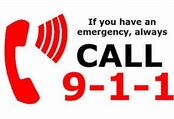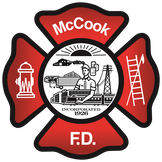outside line.
West Central Consolidated Communications (WC3) is a consolidated dispatch center which serves the Villages of McCook, North Riverside, Riverside, and Brookfield. The primary goal of WC3 is to provide a consolidated 9-1-1 system that can efficiently and effectively handle emergency and non-emergency calls and initiate requests for police, fire and EMS. The center also strives to provide professional telecommunicators and 9-1-1 call takers and to provide those services affordably to the residents, business community and public.
It is the of goal West Central Consolidated Communications, in partnership with the member agencies, to provide emergency communications for the saving and protection of the lives and property of the citizens they serve.
Residents and businesses must remember that all emergency and non-emergency calls are routed to WC3 (currently housed in the North Riverside Police Department) and not to the McCook Police Department. Administrative phone calls will still reach the police desk during business hours.
In 2015, the Illinois General Assembly adopted Public Act 99-0006. Is summary, the Act was adopted to prepare Illinois for the implementation of a statewide "Next Generation" 911 system. Next Generation 911 (NG911) systems include greater data capacity and broad interoperability with more communication media (including text messages, web submissions and video calls) than the currently operating enhanced (E911) system. All local 911 systems in Illinois are required to become NG911 compliant no later than July 1, 2020.
What can you expect when calling 911?
When calling 9-1-1, please do your best to collect your thoughts and ensure that what you are calling to report is, in fact, an emergency (medical emergencies, crimes in progress or crimes that just occurred, traffic collisions, fires, etc…).
A dispatcher will answer and state, “9-1-1 emergency, where is your emergency?” You are now in the hands of a person who is trained in dealing with crisis communications. Your average dispatcher has received extensive training to assist with handling all types of calls from people facing emergency situations. When a dispatcher answers 9-1-1, they must be ready for any type of call that gets reported. They must also be ready to quickly, and accurately, collect facts, while making critical decisions based on a minimum amount of information.
The first decision the dispatcher must make is the type of emergency that you are reporting. If you are reporting a medical emergency, the dispatcher is trained to ask several questions to determine the severity of the illness or injury. This information is important to know, to ensure the correct resources can be dispatched to assist you. If you are reporting a fire, the dispatcher will try to determine what is burning and where, because different fires require different types of fire suppression equipment. An important thing to remember for all 9-1-1 calls is to stay on the phone and try your best to maintain your composure until the dispatcher tells you to hang up. All dispatchers are trained to deal with hysterical callers. Unfortunately, calming down a caller takes up valuable time that can be better served obtaining the critical information needed to dispatch units based on your call.
Each time you dial 9-1-1, the call starts an intricate chain of events which are intended to provide you with the assistance you need. Each 9-1-1 call is different and the dispatcher must be prepared to be the calming influence when dealing with all callers, no matter the crisis. Furthermore, our dispatchers must always be flexible as there are no set of formulas when dealing with incoming phone calls, only general guidelines. When dealing with people in crisis, flexibility is the key. The dispatchers who handle 9-1-1 calls for WC3 use the best practices and are revered in their line of duty. Your safety, the safety of your family, and the safety of our firefighters and police officers who respond to your emergency, depends on the communication skills and training of our dispatchers. These professionals play a major role in the safety our community!
If you dialed 9-1-1 in error, do not hang up. Instead, stay on the line and explain to the dispatcher that you dialed by mistake and that you do not have an emergency. A police officer may still respond to verify that you are OK, so it is very important to be careful when dialing extensions or prefixes to get an outside line.
It is the of goal West Central Consolidated Communications, in partnership with the member agencies, to provide emergency communications for the saving and protection of the lives and property of the citizens they serve.
Residents and businesses must remember that all emergency and non-emergency calls are routed to WC3 (currently housed in the North Riverside Police Department) and not to the McCook Police Department. Administrative phone calls will still reach the police desk during business hours.
In 2015, the Illinois General Assembly adopted Public Act 99-0006. Is summary, the Act was adopted to prepare Illinois for the implementation of a statewide "Next Generation" 911 system. Next Generation 911 (NG911) systems include greater data capacity and broad interoperability with more communication media (including text messages, web submissions and video calls) than the currently operating enhanced (E911) system. All local 911 systems in Illinois are required to become NG911 compliant no later than July 1, 2020.
What can you expect when calling 911?
When calling 9-1-1, please do your best to collect your thoughts and ensure that what you are calling to report is, in fact, an emergency (medical emergencies, crimes in progress or crimes that just occurred, traffic collisions, fires, etc…).
A dispatcher will answer and state, “9-1-1 emergency, where is your emergency?” You are now in the hands of a person who is trained in dealing with crisis communications. Your average dispatcher has received extensive training to assist with handling all types of calls from people facing emergency situations. When a dispatcher answers 9-1-1, they must be ready for any type of call that gets reported. They must also be ready to quickly, and accurately, collect facts, while making critical decisions based on a minimum amount of information.
The first decision the dispatcher must make is the type of emergency that you are reporting. If you are reporting a medical emergency, the dispatcher is trained to ask several questions to determine the severity of the illness or injury. This information is important to know, to ensure the correct resources can be dispatched to assist you. If you are reporting a fire, the dispatcher will try to determine what is burning and where, because different fires require different types of fire suppression equipment. An important thing to remember for all 9-1-1 calls is to stay on the phone and try your best to maintain your composure until the dispatcher tells you to hang up. All dispatchers are trained to deal with hysterical callers. Unfortunately, calming down a caller takes up valuable time that can be better served obtaining the critical information needed to dispatch units based on your call.
Each time you dial 9-1-1, the call starts an intricate chain of events which are intended to provide you with the assistance you need. Each 9-1-1 call is different and the dispatcher must be prepared to be the calming influence when dealing with all callers, no matter the crisis. Furthermore, our dispatchers must always be flexible as there are no set of formulas when dealing with incoming phone calls, only general guidelines. When dealing with people in crisis, flexibility is the key. The dispatchers who handle 9-1-1 calls for WC3 use the best practices and are revered in their line of duty. Your safety, the safety of your family, and the safety of our firefighters and police officers who respond to your emergency, depends on the communication skills and training of our dispatchers. These professionals play a major role in the safety our community!
If you dialed 9-1-1 in error, do not hang up. Instead, stay on the line and explain to the dispatcher that you dialed by mistake and that you do not have an emergency. A police officer may still respond to verify that you are OK, so it is very important to be careful when dialing extensions or prefixes to get an outside line.



